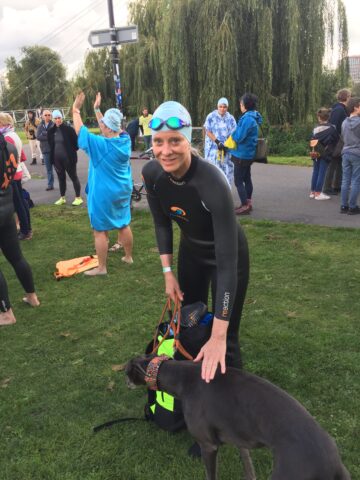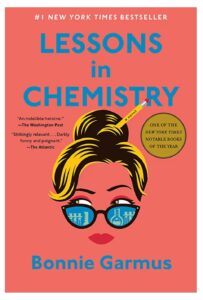Courtesy: Eney Jones.
Below is a Q&A with author and open water swimmer Bonnie Garmus – author of Lessons in Chemistry, a New York Times best-seller, and soon to be an Apple TV series.
“Many swimmers exhibit time management that takes years for others to figure out. Talk about perseverance through hard times. Every swimmer has swam a race, touching the wall to look up at the clock and realize their time wasn’t quite what they had hoped for. Without perseverance many would quit as they felt like a failure”
Jori Rzepecki
#1. It was no surprise to find out you used to row competitively and now for enjoyment, you swim daily in Lake Zurich. Your persistence is that of an open water swimmer having gone through 98 agents to get the book published; having to deal with elements constantly changing. How did open water swimming help you in dealing with this process?
This book wasn’t the one that got 98 rejections–my other novel was–although no one read that one–it was too long. I’d queried 98 agents and it was the length of that novel (roughly 700 pages) that kept their interest at bay. Long books often don’t sell well, especially for a debut, plus they’re far more expensive to publish. So I made sure to keep my next attempt shorter. But finding a way to write Lessons in Chemistry after being rejected so soundly for the other book was hard. Still, there was always this voice in the back of my head that said, “Really? That’s it? You quit?” So after a bad day at work, I started Lessons and five years later, I finished. (Work got in the way a lot.) Still, I found the same thing true with the second book: writing a novel is a marathon–it’s that long-distance swim that goes on forever–the one where the shore never gets closer. Except with a novel, you find yourself doing that swim over and over again. So I’d say both swimming and rowing helped me with the endurance part of writing. We all know what it’s like to suffer. But as swimmers and rowers, we all know we can and will survive it.
#2. I struggled at first with the book. I felt as if you had gotten access to my brain and the story of my life. The misogynistic environment that exists in business and sports, that women must transcend, and often be better than their male counterparts to be accepted, was tough to read. I have also read that you wrote this book in honor of your mother, but do you feel it will help your daughters and the next generation deal with these challenges as women and use these challenges as opportunities?
Yes, I wrote the book in honor of my mother. I was very proud of her! But I also know she had to give up what she loved (nursing) to stay home with four kids. I do hope the book will help the next generation deal with the challenges faced by young women today–remind them that they actually can change things. I think the most important thing to remember is that you can’t allow others to put you in a box; to tell you who you are. You have to summon bravery–to stand up for yourself and others. I have high hopes for future generations based on what I hear from young readers right now. Like my own daughters, they inspire me.
#3. You were working as a copyright editor, how did you schedule your life in order to accomplish not only the writing of your debut novel, and research being a chemist, but also the continuation of your daily life?
I’m a copywriter and creative director (a longer way of saying “writer”) so I’m lucky: I’ve been practicing the craft of writing for a very long time. But I did find it hard to set aside the time to write and research. I finally figured out that if I were to have any chance of writing this book, I had to get up early and do it then. So I’d start my writing day at 4:30 a.m.–before work. As for the research, the chemistry was a challenge, especially because I had to confine it to the late 1950s. But I was able to do it with an old textbook and a book of experiments. I usually conducted my experiments when no one was around; I worried about toxic vapors, fumes, and/or setting fires (for good reason, as it turned out). It’s always a matter of finding a way to make the time–that’s the hard part. Especially when you’re pretty sure nothing will come of it.
#4. Is 6:30 the smart dog and companion in the book based on your dog 99?
Six-Thirty is the only character in the book based on a live being–in this case, our dog, Friday, who died a while back. Friday had been badly abused by her previous owner–so much so, that he went to jail. But she made an eventual comeback and immediately impressed us with her protective nature and off-the-charts intelligence. We didn’t set out to teach Friday words–she learned by watching and listening to us. When we were transferred from Seattle to Switzerland, I swear she learned German. She was a remarkable dog; extremely loving, kind, strong, and big-hearted. I always read what I write out loud (even with copywriting) so when I was writing Lessons, I read it out loud to her. I’m pretty sure she thought Six-Thirty should have had a MUCH bigger role. As for 99, she was named after a friend of mine who died unexpectedly. This friend and I had called each other 86 and 99 for decades after some characters on a show called Get Smart. When she was suddenly not there anymore, I really suffered. So when we finally got a new dog, we named her 99 in honor of my friend. It was the best thing I could have done to celebrate her life.
#5. I love how Elizabeth Zott’s (the protagonist) life unfolded. Do you believe that sometimes the worst things that happen to you can bring the best outcomes?
I think it’s impossible to escape the bad things in life. Some of them happen by accident; others are just how the world seems to work (unfairly!). But how you deal with tragedy and setbacks–that part is up to you. I’m not saying any of it is easy. But I do think the bad can be put in its place. It doesn’t go away completely, but it doesn’t rule you, either. And sometimes, by outlasting something terrible, you gain strength that would have never been possible before.
I now live in London (for the last six years) so I no longer get to do my daily swim in Lake Zürich! But I do some swimming here in London and continue to try and swim wherever I go.
ABOUT ENEY JONES
Eney Jones has achieved remarkably diverse success as a leading pool, open water and Ironman triathlon swimmer.
- Masters National Champion 100-200-400-500-1500-1650 5k freestyle 2009
- Open Water 5k Champion Perth Australia, May 2008.
- National Masters Champion 200-400-1500 freestyle Champion, Portland Oregon, August, 2008.
- Overall Champion Aumakua 2.4k Maui Hawaii, September 2008
- Waikiki Rough Water Swim 3rd place 2006, second place Overall 2009, 3rd place 2012
- European Record Holder and Masters Swimming Champion, 2005. Records included 200, 400, 800, 1500 m freestyle
- Over twenty time finalist in U.S. Swimming Nationals, including Olympic Trials 1980
- Gold medal NCAA 800 yd freestyle relay 1979, silver Medalist 200 yd freestyle 1979. United States National Team 1979-1980.
- Professional Triathlete 1983-1991. First woman out of the water in every Hawaiian Ironman participated (6).


